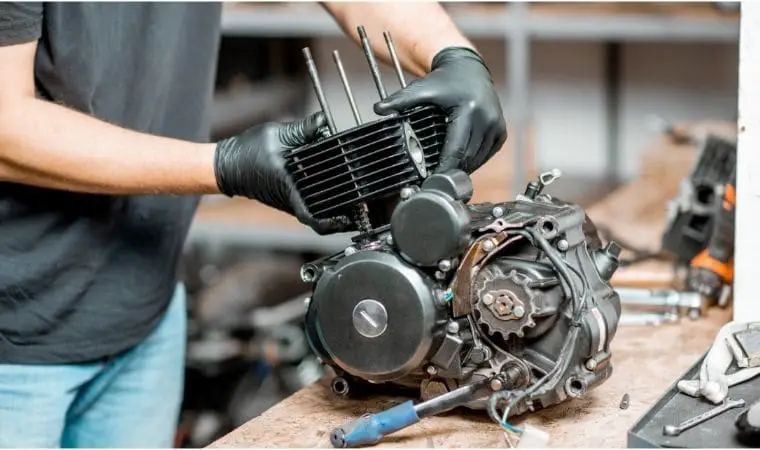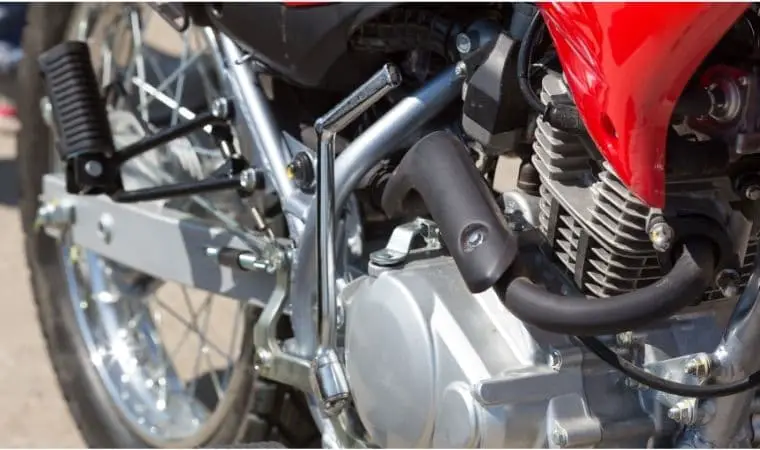In an era of electric bikes, a lot of people still want motorized bikes. The reason being the iconic engine noise and the classic feel. Many bike lovers can even distinguish bikes based on the engine sound.
Sometimes, the bike noise can also indicate engine health. If the abnormal engine noise is more than usual, then it’s bad news. So it’s important to know about the engine noises and troubleshooting them.
To help you with that, we’re going deep into the reasons behind the noises and motorcycle engine noise troubleshooting. So read to the end to know more….
Why is there Engine Knocking Sound?

Sometimes we hear the motorcycle whining Noise when accelerating. But what’s the reason behind it? The primary reason behind this is premature detonation.
We all know there are pistons inside the motorcycle engine. The pistons move up and down and complete the strokes. But if they’re unable to do so, they deviate and hit the wall of the cylinder. As a result, we hear the knocking sound.
Other than premature detonation, there are a few reasons as well. Valve tapping, loose bearings, irregular cylinder walls are the top reasons behind engine knocking sound!
Reasons behind Motorcycle Whirring Noise
As you already know the reasons behind the motorcycle engine knocking sound, now, you’re going to dive deeper into these causes.
1. Premature Detonation
Premature detonation is by far the worst possible thing that can happen to your engine. If you hear a motorcycle clicking noise when accelerating, this is the possible reason behind it.
But why does premature detonation happen? Before we go directly into it, you need to have knowledge of the four-stroke engine. The majority of motorcycle manufacturers use a four-stroke engine system in their bikes.
In a four-stroke engine, there is an intake valve and an outlet valve. The intake valve takes in the air and fuel. After entering the chamber, the mixture is compressed by the pistons, and the pressure increases as the air-fuel mixture cannot go out.
Due to the pressure created on the chamber, a spark is generated, and the pistons go up and down. But how is this related to premature detonation? When the air-fuel mixture is ignited by the spark before the piston cylinders reach the top, in that case, the pistons deviate and hit the cylinder walls. You should also ensure proper engine oil viscosity so that the pistons can move freely.
When the excessive piston force hit the walls, you can notice a knocking or whirring noise! Premature detonation occurs for the mistiming of the spark plug. In old motorbikes, these plugs need to be manually operated to maintain the timing of the spark.
Putting a incorrect spark plug or a bad spark plug can also result in an engine knocking sound.
2. Irregular shape of Cylinder Walls
When you’re using a bike for years, the cylinder walls can indeed get warped. They cannot hold their perfect shape. So, for this reason, the wall can come in between the path of the piston cylinder.
As you already know, the piston continuously moves up and down. So if they collide with the walls when going up and down, the engine makes a knocking sound.
The primary cause of cylinder warps is overheating of the motorcycle engine. As you already know, there is a high temperature inside the engine. Due to this, the metallic walls of the cylinder can sometimes even melt. But normally, they get deformed.
The overheating deforms the engine walls and makes them come in the way of the position. And when the pistons receive a barrier in their way, it results in a ticking sound known as engine knocking!
3. Valve Tapping
As modern engines are also known as interference engines, the pistons hit the valve when they are open. So you need to adjust the timing of the hit properly. Because the valve timing is wrong, the piston can hit the valve and deform or bend it. So there’ll be a motorcycle engine sound effect
The valve tapping can also occur due to premature detonation or engine overheating. Also, if the valve experience more pressure inside the chamber, it can lose its shape. So it’s necessary to keep a valve clearance.
If the engine makes a knocking or whirring sound, valve slamming can be a reason behind it. If the timing is even delayed by a millisecond, the piston can hit the valves. So how do you stop engine knocking engine valve noise? We’ll get back to you!
4. Loose Bearings
There are numerous bearings used in the motorcycle engine. The bearings can spin freely to do their respective tasks.
The crankshaft also has a bearing that helps in the spinning of the arm. As this bearing controls the movement, so by any chance, if it doesn’t work, the crankshaft cannot stay in its usual position.
As a result, it comes in the way of the pistons and clashes with them. When the bearings are used for a long time, it causes the bearing to malfunction. So they reach the wear limit and end up loosing and causing problems. One of the reasons behind this wearing is inappropriate engine oil viscosity. So the motorcycle engine makes a rattling noise
Yes, there are some common engine noises. But not all of them. Now that we’ve learned the common engine issues behind the engine’s tickling noise, let’s head on to how to solve them.
How do I stop my motorcycle engine from making Noise?
If your engine makes a knocking sound for a long time, then it’s obviously alarming. If it goes for a prolonged period your time, it can fully damage the engine. So as you know the reasons, you need to stop them as well.
When you hear the sound coming from your engine, you need to take a step at once. If you hear motorcycle chain noise when accelerating, you must stop your bike at once. Do not try to drive the bike until the issue is resolved.
The severity of the issue can only be understood when it’s appropriately diagnosed. So you need to find the exact reason behind this sound.
First, start with the things that you’ve got a clear idea about. You can remove the side panels and check if the spark plug has adequate space or not. There is an easy hack to calculate the adequate space for the plug.
- There is a gauge to calculate the plug’s gap. This is almost like a half-dollar. You can use it to find an adequate gap. If the coil doesn’t sit in the gaps, it means you’re using a bad plug.
- Primarily, try changing the engine oil, add coolants according to need.
Next, you can check the carburetor of the engine. If it is somehow misplaced, you can adjust it by tightening the screws.
Still, if your bike is making a noise, the perfect solution would be to take it to a professional mechanic.
How do you fix a ticking sound in an engine?

Does only knowing the problems enough to solve them? Absolutely not. Motorcycle engine noise troubleshooting is a must to identify and solve the engine’s whirring noise. Taking proper measures will fix the tickling sound, and at the same time, this will keep the engine in good condition.
Here’s how to prevent the motorcycle engine knocking sound-
- First things first, use premium quality oil. Often we see people use cheap oils just to save some buck. But this shouldn’t be done. Cheap oils have ethanol that is highly risky for bike engines.
- Regular check-ups are a must. Your oil needs to be changed after a certain period. Using oils for a long period can have an adverse effect on the engine and the motorbike. Even if you’re not driving your bike, you still need to change motor oils. Also, you should use correct spark plugs.
- Another important thing is to prevent the engine from overheating. Overheating causes valve noise in the engine. That’s why you should use a coolant in your engine to keep the engine at an optimum temperature.
- Lastly, every two years, you should get a tune-up. This tuning-up process is very important to keep the bike in a stable condition. The bike’s completely teared up during the process, and each and everything on it is tested. So if there’s any problem inside, you’ll know about it.
Conclusion:
So that’s it for motorcycle engine noise troubleshooting. We mainly divided the whole article into 3 parts.
In the first one, we showed you the reason and types of engine whirring sound. The second one was an easy demonstration of how you can stop it on your own. And finally, in the last part, we showed and told you how to prevent the causes.
Hope you’re clear now, right? Good luck!
